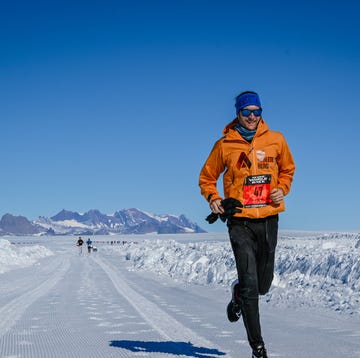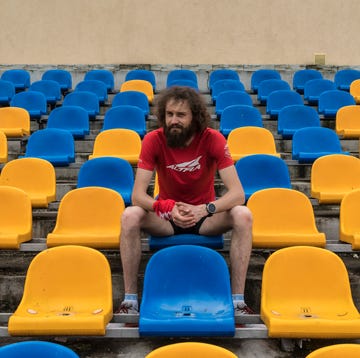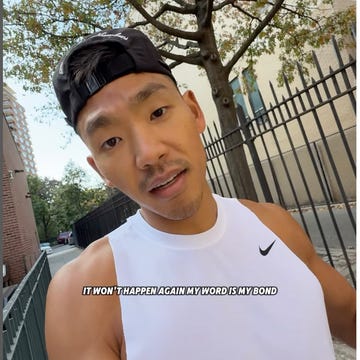On November 11 last year, beside 50 runners along the Lincoln Memorial Reflecting Pool in Washington, D.C., Rob Jones took the final steps of a monthlong journey of marathons. The day came seven years after one fateful step during a search for improvised explosive devices in Afghanistan triggered a blast that cost Jones both legs.
Within two weeks of his above-the-knee amputations, Jones plotted to make the 2012 Paralympics. “I saw my injury as an opportunity,” he says. The 32-year-old Virginia native trained as a rower and took bronze with his partner Oksana Masters.
That same ambition compelled the Marine Corps veteran to bike 5,180 miles from Maine to California in the winter of 2013 to 2014, raising $126,000 for wounded veteran charities. Then Jones devised his latest endeavor: run 31 marathons in 31 cities in 31 days. “I thought I would try to totally blow people’s minds,” he says.
To accomplish the feat, he needed a clear plan. So he enlisted friend Colin Kubarych, who did most of the driving; his mom, Carol Wire, who prepared his meals; and his wife, Pamela Relph, who did just about everything else.
With them, he mapped his route, which began in London and then crisscrossed the United States and Canada. “Rob thinks through decisions carefully,” Relph says. “That allows him to succeed at these big challenges.”
RELATED: Veterans Find Peace Through Running
Jones never ran a sanctioned marathon. Instead, he did loops in city parks or out-and-backs on trails. Starting at 7 a.m. each day, he broke his mileage into four intervals with 20-minute breaks in between, averaging 3 hours and 52 minutes of running a day. The rest of his time was spent eating—upwards of 4,000 daily calories—and resting.
Before running, Jones posted his route online and was often greeted by people who jumped in to run with him. “A guy in Boston who had terminal cancer ran with me,” he says. “I’ve had people run their first marathons with me, and a guy who ran his 295th.”
Jones finished his 31st marathon on a frosty Veterans Day, hurting bad and trying not to trip. In total, he had raised more than $200,000 for wounded veteran charities—and sent an invaluable message: “I hope that a veteran who comes home psychologically or physically wounded will see what I’m doing, and realize that we aren’t broken or incapable of reintegrating into society.”












